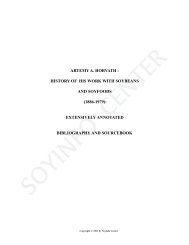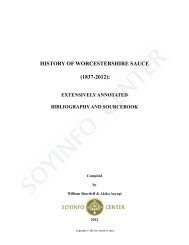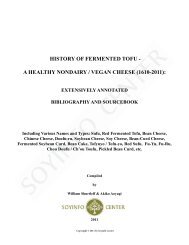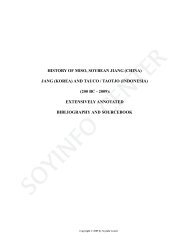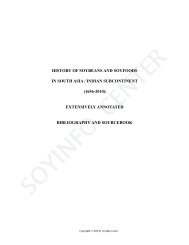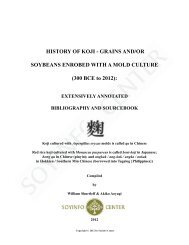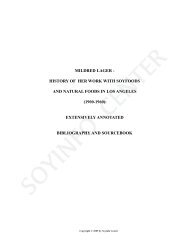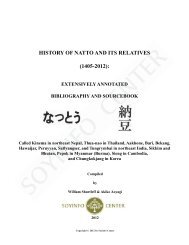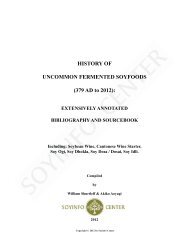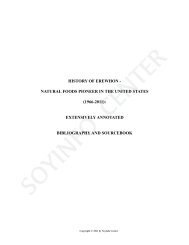history of soy yogurt, soy acidophilus milk and other ... - SoyInfo Center
history of soy yogurt, soy acidophilus milk and other ... - SoyInfo Center
history of soy yogurt, soy acidophilus milk and other ... - SoyInfo Center
You also want an ePaper? Increase the reach of your titles
YUMPU automatically turns print PDFs into web optimized ePapers that Google loves.
cultures & tastes incredible. Non-GMO. Vegan. Kosher<br />
pareve. Casein, whey & gluten free.” On the back: Nutrition<br />
facts. Ingredients (for each fl avor). He did it! “Ted Nordquist<br />
deserves a st<strong>and</strong>ing ovation.” A portrait photo shows Ted.<br />
Now comes in nine fl avors: Vanilla bean, lemon ginger,<br />
crème caramel, mocha fudge, Swiss dark chocolate, french<br />
vanilla, very strawberry, black cherry, <strong>and</strong> chocolate<br />
hazelnut.<br />
1252. Nordquist, Ted. 2002. Report to ACDI/VOCA on<br />
ProSoy Santa Fe, Ltd. / CEDETI, Project #153041 in<br />
Bolivia. San Francisco, California. 15 p. Sept. 13. 28 cm.<br />
• Summary: Ted has just returned from three weeks (Aug.<br />
12-Sept. 16) in Bolivia working with ProSoy Santa Fe, Ltda.,<br />
a women’s co-op that makes <strong>soy</strong><strong>milk</strong> at Av. Melchor Pinto<br />
No. 211, Santa Fe, Bolivia. Phone: +591 3 334-1663. Fax:<br />
+591 3 334-078. email: cedeti@cotas.com.bo. Website:<br />
www.cedeti.org. Ted’s counterpart at ProSoy was Mrs.<br />
Rosa Angulo, President. The project manager was Engineer<br />
Ana Cristina Betancourt, Executive Director <strong>of</strong> CEDETI.<br />
Interpreter: Jaime Ugrinovic.<br />
Santa Fe is a small town <strong>of</strong> about 3,000 inhabitants<br />
located 120 km north <strong>of</strong> the city <strong>of</strong> Santa Cruz in western<br />
Bolivia. The town is strongly infl uenced by the commercial<br />
activity <strong>of</strong> Yapacani, a city <strong>of</strong> 15,000 situated km from Santa<br />
Fe. This is an agricultural area with <strong>soy</strong>beans as one <strong>of</strong> the<br />
main crops.<br />
ProSoy presently makes 150 liters/day <strong>of</strong> <strong>soy</strong><strong>milk</strong><br />
using rustic processing techniques. They were grinding<br />
their <strong>soy</strong>beans in a 25 liter mixer that took 20 minutes to<br />
complete; Ted sent them a new Corenco M6 disintegrator.<br />
Ted showed them how to improve their <strong>soy</strong><strong>milk</strong> process <strong>and</strong><br />
to make drinkable <strong>soy</strong> <strong>yogurt</strong>, okara burgers, okara patties,<br />
okara bread, <strong>and</strong> <strong>soy</strong> ice cream.<br />
This report is accompanied by a 3-page background<br />
report (with no title, author, or date) on ProSoy that CEDETI<br />
prepared for Ted at his request, for him to study before his<br />
trip. It discusses: Equipment. Bottling. Milk processing<br />
plant. Competition. The organization <strong>of</strong> the women’s group.<br />
Business experience. System <strong>of</strong> production. Plans for the<br />
future. The women’s language <strong>and</strong> culture. The women<br />
formed this project named “Production <strong>of</strong> Soy Milk” on 25<br />
Jan. 1997 at 7:00 p.m. But they fi rst began to sell their <strong>soy</strong><br />
<strong>milk</strong> several years later. Address: TAN Industries, Inc., 49<br />
Stevenson St., Suite 1075, San Francisco, California 94105-<br />
2975; 660 Vischer Ct., Sonoma, CA 95476. Phone: 415-495-<br />
2870. Fax: 415-495-3060, Email tedalan@sirius.com.<br />
1253. Stacey, Michelle. 2002. Weighing the health benefi ts <strong>of</strong><br />
<strong>soy</strong>. Martha Stewart Living. Oct. p. 90, 92, 94, 96.<br />
• Summary: Under “the good news” <strong>and</strong> “the bad<br />
news” discusses the benefi ts <strong>and</strong> possible (but unclear)<br />
disadvantages.<br />
HISTORY OF SOY YOGURT & CULTURED SOYMILK 483<br />
© Copyright Soyinfo <strong>Center</strong> 2012<br />
1254. Nordquist, Ted. 2002. Modesto WholeSoy Co. to<br />
start new <strong>soy</strong>base plant in Modesto, California (Interview).<br />
SoyaScan Notes. Nov. 21. Conducted by William Shurtleff <strong>of</strong><br />
Soyfoods <strong>Center</strong>.<br />
• Summary: Modesto WholeSoy Co. will soon began making<br />
<strong>soy</strong>base in Modesto, California. The new company, which is<br />
independent <strong>of</strong> TAN Industries, is owned by Ted Nordquist,<br />
Henry Glasser, <strong>and</strong> two <strong>other</strong>s. This is the plant Ted has been<br />
dreaming <strong>of</strong> for 20 years. In 1982 Ted worked with Alfa-<br />
Laval in Sweden to build his fi rst <strong>soy</strong>base plant in one corner<br />
<strong>of</strong> their building in Sweden. He has signed a 20-year lease<br />
on the building. The plant has a capacity <strong>of</strong> four production<br />
lines for converting whole <strong>soy</strong>beans to <strong>soy</strong>base. The fi rst line<br />
can make 1,000 gallons/hour <strong>of</strong> <strong>soy</strong>base. The <strong>soy</strong>base will be<br />
used to make <strong>soy</strong><strong>milk</strong>, <strong>soy</strong> <strong>yogurt</strong>, cultured <strong>soy</strong> drinks, <strong>and</strong><br />
<strong>soy</strong> ice cream. All packaging will be done at the Super Store<br />
Industry plant in Turlock, which is 15 minutes away by car.<br />
This plant can package <strong>soy</strong><strong>milk</strong> in plastic bottles / jugs with<br />
screw-tops or cartons. This October, at the Natural Products<br />
Expo, Ted’s company introduced a new <strong>soy</strong><strong>milk</strong> product in<br />
a 96-ounce (6-quart) plastic bottle. After years <strong>of</strong> work, Ted<br />
has developed a new <strong>and</strong> very exciting way <strong>of</strong> using okara as<br />
a food source by processing it hot, when it is almost sterile,<br />
in a continuous process. Not long after the new plant begins<br />
operation, he expects to launch a new food product with<br />
okara as a (or the) major ingredient under the WholeSoy<br />
br<strong>and</strong>. He has no plans to try to patent the new process or<br />
product. Ted will keep his plant at the Soyfoods <strong>of</strong> America<br />
in Duarte, California, as a backup. Address <strong>of</strong> Modesto<br />
WholeSoy Co.: 1836 Lapham Dr., Modesto, California,<br />
95354-3900. Phone: 209-253-5119. Fax: 209-523-5519.<br />
Update: Talk with Ted Nordquist. 2003. Feb. 19. All<br />
permits have been obtained <strong>and</strong> all is going well. The<br />
Modesto plant plans to begin testing equipment <strong>and</strong> boilers<br />
using water, in two days.<br />
Update: Talk with Ted Nordquist. 2003. March 13. The<br />
fi rst run <strong>of</strong> commercial <strong>soy</strong>base was produced at the Modesto<br />
plant on 6 March 2003. There is much room for expansion;<br />
three more lines, each with a capacity <strong>of</strong> 2,000 gallons/hour<br />
<strong>of</strong> <strong>soy</strong>base, could be added as dem<strong>and</strong> grows. Working 3<br />
shifts/day <strong>and</strong> 5 days/week, the plant (with four lines) has<br />
a capacity <strong>of</strong> 24-26 million gallons/year <strong>of</strong> <strong>soy</strong>base which<br />
converts to 54 million gallons/year <strong>of</strong> <strong>soy</strong><strong>milk</strong>. Address:<br />
TAN Industries, Inc., 49 Stevenson St., Suite 1075, San<br />
Francisco, California 94105-2975; 660 Vischer Ct., Sonoma,<br />
CA 95476. Phone: 415-495-2870.<br />
1255. Nordquist, Ted. 2002. Soyfoods are thriving in Bolivia<br />
(Interview). SoyaScan Notes. Nov. 21. Conducted by William<br />
Shurtleff <strong>of</strong> Soyfoods <strong>Center</strong>.<br />
• Summary: The oldest major company is Alimentos Alfa<br />
Ltda. in Cochabamba, Bolivia, run by Rene Mouton-Bluys<br />
(a native <strong>of</strong> Belgium). This company makes 36,000 gallons/<br />
week <strong>of</strong> <strong>soy</strong>base then converts it to Nordl<strong>and</strong> <strong>soy</strong><strong>milk</strong>, <strong>soy</strong>



